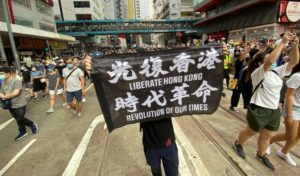 25 April 2021.
25 April 2021.
The Centre for Law and Democracy (CLD) is today releasing an Analysis of the Law of the People’s Republic of China on Safeguarding National Security in the Hong Kong Special Administrative Region (referred to informally as the national security law for Hong Kong). The law has become notorious for its broad restrictions on commonplace expressive activity and the extensive control it gives mainland China over criminal prosecutions in Hong Kong, as well as its frequent use, including against leading media and pro-democracy personalities, such as Jimmy Lai. The CLD Analysis, which was produced with support from the International Federation of Journalists (IFJ), outlines the precise legal means used in the law to achieve those repressive aims.
“It is a supreme irony that this law, which was introduced in response to the protests in Hong Kong against threats to introduce legislation to allow criminal suspects to be extradited from Hong Kong to China, not only allows such extraditions but goes so much further,” said Toby Mendel, Executive Director, CLD. “With this legislation China has affirmed, comprehensively, its legal and practical control over freedom of expression in Hong Kong.”
The law creates four new broadly worded offences, namely secession, subversion, terrorist activities and collusion with a foreign country. All four offences are problematical. For example the offence of terrorist activities criminalises the vague notion of “advocating for” terrorism. But collusion with a foreign country is the most flexible, covering broad notions which have no place in the criminal law, such as disrupting the formulation of laws, engaging in hostile activities against Hong Kong or China and provoking hatred against government.
Some of the key other problematical measures in the law include the following:
-
- It reverses the normal presumption in favour of bail, which will be granted only if judges have sufficient evidence that the accused will not endanger national security.
- It provides for cases about national security to be tried by judges who are hand picked on one-year terms by the Chief Executive.
- It creates a high-level oversight Committee which is “under the supervision of and accountable to the Central People’s Government”.
- It also creates a Hong Kong office of China’s security services, essentially a Hong Kong outpost for their operations, and grants it extensive powers.
- It allows for cases to be transferred to mainland China’s justice system, including at the discretion of the office mentioned in the previous point.
- It grants the police broad powers to order the takedown of content, as well as to intercept and conduct surveillance of communications without the need to obtain any judicial authorisation.
The Analysis is available here.
For further information, please contact:
J.Y. Hoh
Legal Officer
Centre for Law and Democracy
Email: jyhoh@law-democracy.org
+1 416 833-2918
www.law-democracy.org
twitter: @law_democracy



